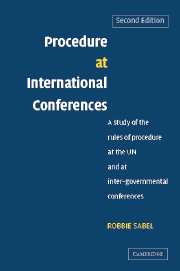 Procedure at International Conferences
Procedure at International Conferences Book contents
- Frontmatter
- Contents
- Preface to the second edition
- List of abbreviations and conference references
- Introduction
- 1 Historical development of rules of procedure of conferences and attempts to establish model rules
- 2 Adoption of rules of procedure
- 3 Rules of procedure and international law
- 4 Invitations, participation and credentials
- 5 Presiding officer and other officers of the conference
- 6 Meetings
- 7 Statements by delegations
- 8 Submission of proposals
- 9 Adjournment and closure of debate
- 10 Amendments
- 11 Withdrawal and reconsideration of motions
- 12 Procedural motions and points of order
- 13 Priorities between different proposals
- 14 Decision taking and method of voting
- 15 Majority required
- 16 Consensus
- 17 Separate votes
- 18 Conduct of voting – interruption of voting and correction of vote
- 19 Languages, records and documents
- 20 Committees
- 21 Suspension and amendment of rules of procedure
- Bibliography
- Index
5 - Presiding officer and other officers of the conference
Published online by Cambridge University Press: 22 July 2009
- Frontmatter
- Contents
- Preface to the second edition
- List of abbreviations and conference references
- Introduction
- 1 Historical development of rules of procedure of conferences and attempts to establish model rules
- 2 Adoption of rules of procedure
- 3 Rules of procedure and international law
- 4 Invitations, participation and credentials
- 5 Presiding officer and other officers of the conference
- 6 Meetings
- 7 Statements by delegations
- 8 Submission of proposals
- 9 Adjournment and closure of debate
- 10 Amendments
- 11 Withdrawal and reconsideration of motions
- 12 Procedural motions and points of order
- 13 Priorities between different proposals
- 14 Decision taking and method of voting
- 15 Majority required
- 16 Consensus
- 17 Separate votes
- 18 Conduct of voting – interruption of voting and correction of vote
- 19 Languages, records and documents
- 20 Committees
- 21 Suspension and amendment of rules of procedure
- Bibliography
- Index
Summary
Presiding officer
Bailey writes that ‘an incompetent presiding officer can, single-handedly, create procedural chaos if he does not understand the Rules, or does not enforce them, or acts in a dictatorial or partisan manner’. Delegations to conferences are apparently aware of the dangers pointed out by Bailey since, although the appointment of presiding officers is dictated by political considerations, the tacit understanding among delegations is to appoint competent individuals. The records of conferences show that it is very rare that this tacit understanding is violated.
Appointment of presiding officer
One of the earliest discernible practices of international conferences was the practice of appointing a senior representative of the host country as the presiding officer, or at least as the presiding officer of the opening session. President Wilson, in his speech nominating Clemenceau as President of the Paris Peace Conference, referred to the election of a representative of France as being ‘in conformity with usage’. Clemenceau, in his opening speech at the Conference, referred to his being chosen President as a ‘lofty international tradition and time honoured courtesy shown towards the country which has the honour to welcome the Peace Conference in its capital’. Kolasa, referring to the development of conferences in the second half of the nineteenth century, writes that ‘the President of each conference was invariably the representative of the country where the conference was held’.
- Type
- Chapter
- Information
- Procedure at International ConferencesA Study of the Rules of Procedure at the UN and at Inter-governmental Conferences, pp. 68 - 95Publisher: Cambridge University PressPrint publication year: 2006


